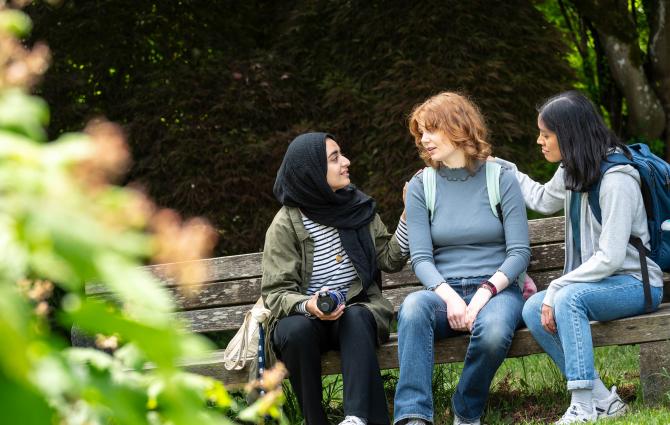Today, October 29, marks the beginning of Thrive Week at UBC.
Thrive is a mindset and week-long series of events focused on helping UBC students, faculty, and staff explore their path to mental health. Over the next 5 days, Thrive UBC will be hosting many activities to help promote mental health, including mindfulness drop-in sessions, a nature walk, a wellbeing drop-in clinic, and many more. You can find a complete list at thrive.ubc.ca/thrive-events/.
One activity that I’m especially excited about is the #LetsThriveUBC social media giveaway. You can participate by checking the @ubcthrive Instagram account between Mon, Oct 29 (after 11:00 am) and Fri, Nov 4 for the Thrive Giveaway post (see below). In the comments below the post, explain how you recharge to be eligible to win one of 20 bright yellow Thrive umbrellas. Enter as often as you like.

Of course, mental health is important every day of the year—not just during Thrive Week, and UBC is committed to fostering an environment in which every member of the university community can thrive, both mentally and physically every day of the year. It’s a key theme in our new strategic plan, Shaping UBC’s Next Century. As the Plan notes, “Our focus on mental health is integral to our success as an institution and as a source of influence for positive change in society.”
It’s not only important to UBC as an institution, it’s important to me personally. I struggled with mental health issues throughout my youth and young adult life. But I kept those struggles to myself. There was a stigma around mental illness that made me reluctant to seek help.
Looking back, I feel very fortunate to have received the medical and psychological support I needed to recover.
For the last 25 years, I’ve been symptom-free. A big part of the balance in my life is that I have a loving family, and they’re always there for me.
The lesson in my story is if you have the proper support, it’s really possible for you to move past that and move back into functioning life.
While physical health is easy to measure and talk about openly, mental health is under the surface and often not talked about at all.
This prevents people from asking for the help they desperately need.
We need to stop the stigma that prevents individuals from asking for help, because the sooner a condition is identified, the sooner it can be healed.
Here at UBC, the diversity of campus communities—including students of all ages, Indigenous students, youth formerly in care, families, single parents, LGBTQ+—brings unique challenges and requirements for support.
We need to provide resources to help every member of the UBC community build coping skills, learn to recognize early when they may need assistance, and get help when they need it.
This is especially important for our students, who are at a vulnerable stage in their lives.
As a university president, I can attest that today’s students—given the proper support—can and do, indeed, thrive.
Today, young people are much more aware of their mental health than when I was in university, and that’s a good thing. Students can be a real inspiration, and they are empathetic to one another. When young people realize they are not alone in experiencing mental health challenges, it motivates them to do something about it, and they are motivated to demand their leaders do something about it, too.
But we can’t leave it up to them.
We must encourage and enable our institutions to cultivate resilience, and to provide students the freedom to try, to fail, to learn from failure, and to try again.
And we must put special emphasis on traditionally less well-served groups, such as Indigenous students, marginalized groups, and first-generation students.
We must ensure we have institutional supports in place and we need to constantly evaluate those supports and ensure that they are working.
We must create environments that lend themselves to balanced healthy lifestyles. For example, we need to think about the ways in which academic programs are designed, the ways that students are encouraged to engage on campus, and how career-building experiences are prioritized.
I’m pleased with UBC’s efforts to date and the supports we have available. When I was younger, there were few supports. But I did have some significant help, for which I am grateful.
I recognize that not everybody has those supports, and that’s why it’s important that we give students—and faculty and staff—of all ages the support they need, when they need it.
So please, take part in some of the Thrive Week activities and help make UBC a thriving, supportive community.
Best wishes,
Santa J. Ono
President and Vice-Chancellor




